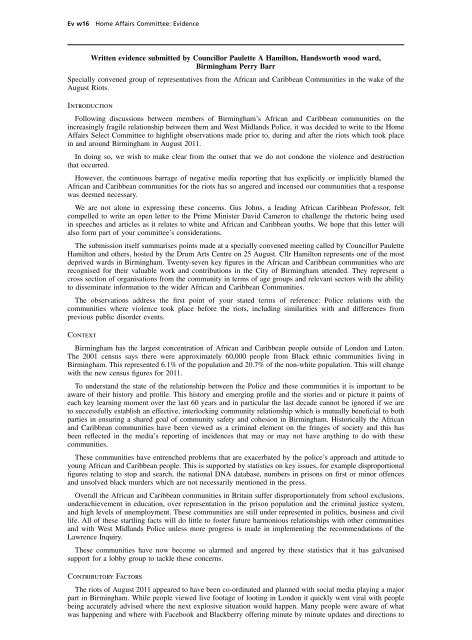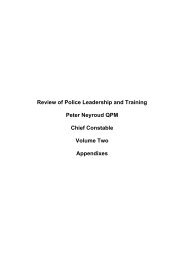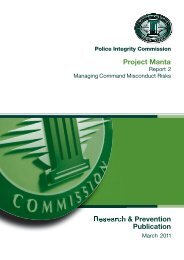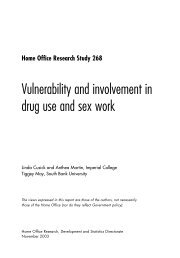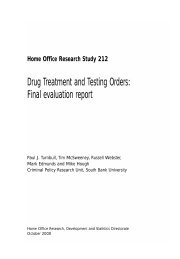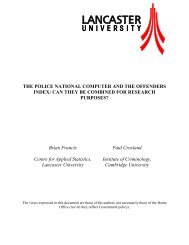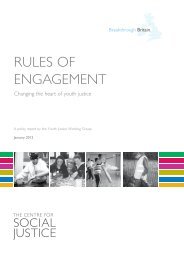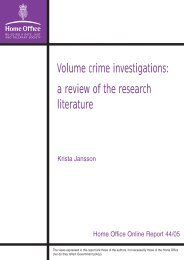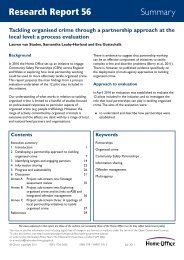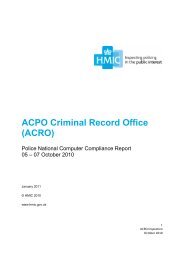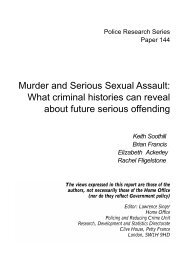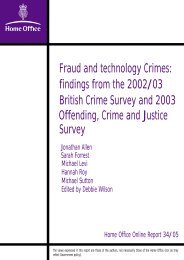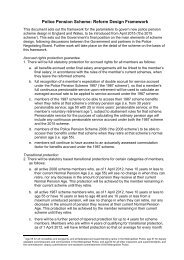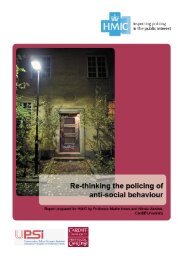Policing Large Scale Disorder: Lessons from the disturbances of ...
Policing Large Scale Disorder: Lessons from the disturbances of ...
Policing Large Scale Disorder: Lessons from the disturbances of ...
Create successful ePaper yourself
Turn your PDF publications into a flip-book with our unique Google optimized e-Paper software.
Ev w16 Home Affairs Committee: Evidence<br />
Written evidence submitted by Councillor Paulette A Hamilton, Handsworth wood ward,<br />
Birmingham Perry Barr<br />
Specially convened group <strong>of</strong> representatives <strong>from</strong> <strong>the</strong> African and Caribbean Communities in <strong>the</strong> wake <strong>of</strong> <strong>the</strong><br />
August Riots.<br />
Introduction<br />
Following discussions between members <strong>of</strong> Birmingham’s African and Caribbean communities on <strong>the</strong><br />
increasingly fragile relationship between <strong>the</strong>m and West Midlands Police, it was decided to write to <strong>the</strong> Home<br />
Affairs Select Committee to highlight observations made prior to, during and after <strong>the</strong> riots which took place<br />
in and around Birmingham in August 2011.<br />
In doing so, we wish to make clear <strong>from</strong> <strong>the</strong> outset that we do not condone <strong>the</strong> violence and destruction<br />
that occurred.<br />
However, <strong>the</strong> continuous barrage <strong>of</strong> negative media reporting that has explicitly or implicitly blamed <strong>the</strong><br />
African and Caribbean communities for <strong>the</strong> riots has so angered and incensed our communities that a response<br />
was deemed necessary.<br />
We are not alone in expressing <strong>the</strong>se concerns. Gus Johns, a leading African Caribbean Pr<strong>of</strong>essor, felt<br />
compelled to write an open letter to <strong>the</strong> Prime Minister David Cameron to challenge <strong>the</strong> rhetoric being used<br />
in speeches and articles as it relates to white and African and Caribbean youths. We hope that this letter will<br />
also form part <strong>of</strong> your committee’s considerations.<br />
The submission itself summarises points made at a specially convened meeting called by Councillor Paulette<br />
Hamilton and o<strong>the</strong>rs, hosted by <strong>the</strong> Drum Arts Centre on 25 August. Cllr Hamilton represents one <strong>of</strong> <strong>the</strong> most<br />
deprived wards in Birmingham. Twenty-seven key figures in <strong>the</strong> African and Caribbean communities who are<br />
recognised for <strong>the</strong>ir valuable work and contributions in <strong>the</strong> City <strong>of</strong> Birmingham attended. They represent a<br />
cross section <strong>of</strong> organisations <strong>from</strong> <strong>the</strong> community in terms <strong>of</strong> age groups and relevant sectors with <strong>the</strong> ability<br />
to disseminate information to <strong>the</strong> wider African and Caribbean Communities.<br />
The observations address <strong>the</strong> first point <strong>of</strong> your stated terms <strong>of</strong> reference: Police relations with <strong>the</strong><br />
communities where violence took place before <strong>the</strong> riots, including similarities with and differences <strong>from</strong><br />
previous public disorder events.<br />
Context<br />
Birmingham has <strong>the</strong> largest concentration <strong>of</strong> African and Caribbean people outside <strong>of</strong> London and Luton.<br />
The 2001 census says <strong>the</strong>re were approximately 60,000 people <strong>from</strong> Black ethnic communities living in<br />
Birmingham. This represented 6.1% <strong>of</strong> <strong>the</strong> population and 20.7% <strong>of</strong> <strong>the</strong> non-white population. This will change<br />
with <strong>the</strong> new census figures for 2011.<br />
To understand <strong>the</strong> state <strong>of</strong> <strong>the</strong> relationship between <strong>the</strong> Police and <strong>the</strong>se communities it is important to be<br />
aware <strong>of</strong> <strong>the</strong>ir history and pr<strong>of</strong>ile. This history and emerging pr<strong>of</strong>ile and <strong>the</strong> stories and or picture it paints <strong>of</strong><br />
each key learning moment over <strong>the</strong> last 60 years and in particular <strong>the</strong> last decade cannot be ignored if we are<br />
to successfully establish an effective, interlocking community relationship which is mutually beneficial to both<br />
parties in ensuring a shared goal <strong>of</strong> community safety and cohesion in Birmingham. Historically <strong>the</strong> African<br />
and Caribbean communities have been viewed as a criminal element on <strong>the</strong> fringes <strong>of</strong> society and this has<br />
been reflected in <strong>the</strong> media’s reporting <strong>of</strong> incidences that may or may not have anything to do with <strong>the</strong>se<br />
communities.<br />
These communities have entrenched problems that are exacerbated by <strong>the</strong> police’s approach and attitude to<br />
young African and Caribbean people. This is supported by statistics on key issues, for example disproportional<br />
figures relating to stop and search, <strong>the</strong> national DNA database, numbers in prisons on first or minor <strong>of</strong>fences<br />
and unsolved black murders which are not necessarily mentioned in <strong>the</strong> press.<br />
Overall <strong>the</strong> African and Caribbean communities in Britain suffer disproportionately <strong>from</strong> school exclusions,<br />
underachievement in education, over representation in <strong>the</strong> prison population and <strong>the</strong> criminal justice system,<br />
and high levels <strong>of</strong> unemployment. These communities are still under represented in politics, business and civil<br />
life. All <strong>of</strong> <strong>the</strong>se startling facts will do little to foster future harmonious relationships with o<strong>the</strong>r communities<br />
and with West Midlands Police unless more progress is made in implementing <strong>the</strong> recommendations <strong>of</strong> <strong>the</strong><br />
Lawrence Inquiry.<br />
These communities have now become so alarmed and angered by <strong>the</strong>se statistics that it has galvanised<br />
support for a lobby group to tackle <strong>the</strong>se concerns.<br />
Contributory Factors<br />
The riots <strong>of</strong> August 2011 appeared to have been co-ordinated and planned with social media playing a major<br />
part in Birmingham. While people viewed live footage <strong>of</strong> looting in London it quickly went viral with people<br />
being accurately advised where <strong>the</strong> next explosive situation would happen. Many people were aware <strong>of</strong> what<br />
was happening and where with Facebook and Blackberry <strong>of</strong>fering minute by minute updates and directions to


